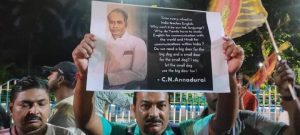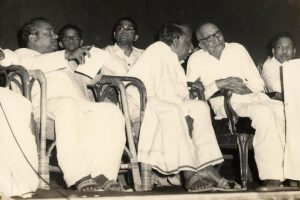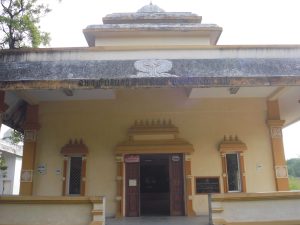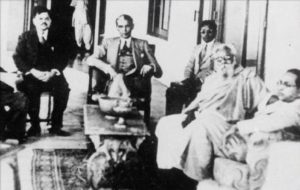The angry reactions were triggered after the official language Committee headed by Home Minister Amit Shah to President Droupadi Murmu. South First speaks to Bangla Bokkho, organiser of the protest and opposition parties in Southern states on how they view the recommendation.

Karunanidhi and Kuvempu posters at the Bangla Bokkho protest held against the Hindi imposition in non-Hindi-speaking states. (Supplied)
What is being viewed as aggressive promotion of Hindi over other languages by the Bharatiya Janata Party (BJP)-led Union government is leading to unity against Hindi hegemony cutting across language barriers.
In the West Bengal capital Kolkata, protests on Wednesday, 12 October, by citizens against imposition of Hindi saw photos of prominent Tamil and Kannada icons being displayed.
Southern states like Tamil Nadu and Karnataka have been vehemently opposing any imposition of Hindi in banking, railway services, display boards, and government events, and also criticising the absence of regional languages in common entrance exams for central services.
On Wednesday, it was West Bengal’s turn. The rally, organised by Bangla Pokkho, a pro-Bangla advocacy organisation, comes against the backdrop of a recommendation made in the 11th volume of the Report of the Official Language Committee led by Union Home Minister Amit Shah.
The report recommends phasing out English as the medium of instruction in central professional institutions like IITs, IIMs, and AIIMS and replacing it with Hindi in Hindi-speaking states and other regional languages elsewhere. The report also recommends making Hindi mandatory instead of English in entrance exams.
The protest, held from the city’s cultural hub Rabindra Sadan to Hazra More, accused the Union government of conspiring to destroy the country’s primary principle of unity in diversity.
Bangla Pokkho on 16 October is set to hold protests in every district of West Bengal. On the same day, Amit Shah, in a first, will launch medical education in Hindi by releasing translated MBBS first-year books in Bhopal.
The protestors, gathered in hundreds, displayed posters of prominent Tamil Nadu and Karnataka figures who during their lives had criticised Hindi imposition.

A man displaying a poster of former Tamil Nadu chief minister CN Annadurai at the Bangla Pokkho protest against Hindi imposition in Kolkata (Supplied)
This included former Tamil Nadu chief ministers CN Annadurai and M Karunanidhi and noted 20th-century Kannada poet Kuppalli Venkatappa Puttappa, known by his pen name Kuvempu.
While chanting slogans against Hindi imperialism, one of the cut-outs featured a famous remark by Annadurai, “Since every school in India teaches English, why can’t it be our link language? Why do Tamils have to study English for communication with the world and Hindi for communication within India? Do we need a big door for the big dog and a small door for the small dog? I say, let the small dog use the big door too!”
About India’s first prime minister Jawaharlal Nehru, a poster quoting Kuvempu read, “Nehru is not greater than Kannada. Let him learn Kannada or get his speeches translated.”

Annadurai (front row, second from left) in conversation with Rajaji (third from left). In the right is M Karunanidhi (Mohan V Raman/Wikimedia Commons)
“In 1965, Tamil Nadu under Annadurai and Karunanidhi showed Hindi imperialism can be defeated. This event served as an inspiration even for Bangla Pokkho. So it’s natural we would carry pictures of our great non-Hindi statesmen,” Garga Chatterjee, general secretary of Bangla Pokkho, told South First.
About Kuvempu, Chatterjee observed, “However big an icon one may be for Delhi or Hindi, be it Nehru or Patel then or Modi today, he showed that an upright Kannadiga [and non-Hindi speaking person] won’t bow his head to Delhi or Hindi.”
Calling Dravidian leaders as his source of inspiration, Chatterjee also recollected the names of Chittaranjan Das and Ashok Mitra, who have contributed to Bengali, and said, “People should also know them in Dravidian states. Non-Hindi speaking people should know about non-Hindi heroes and not the heroes that Delhi teaches us.”
Bangla Pokkho, during its protest, alleged that Hindi imposition will capture non-Hindi resources, which in turn will make future generations of non-Hindi people permanent slaves of Hindi imperialism.
Chatterjee said that the need of the hour is for non-Hindi speaking states to unite. “Though it is not clear whether non-Hindi speaking people will remain the majority in the next 10 years, right now we are the majority,” he said.
Citing the example of CLEAR (Campaign for linguistic equality and rights), a pan-India umbrella organisation of activists who stand for linguistic equality and against Hindi imposition, he noted, “There should be a conclave of activists and leaders in non-Hindi speaking states, and political parties that claim to fight over this issue should also participate.”
Over the last week, Tamil Nadu CM MK Stalin, Kerala CM Pinarayi Vijayan, and Telangana IT Minister KT Rama Rao have shot off letters to Prime Minister Narendra Modi warning him of possible repercussions in the form of widening socio-economic schisms in the country.
Members of the Opposition told South First that any move by the Union government to impose Hindi will affect democracy.
Observing that discussions and debates over language have been happening for more than six decades in national politics, DMK spokesperson Manuraj Shunmugasundaram told South First, “This is not a standalone decision by the Union government as in the past eight years, we have seen systematic discrimination. It culminated in the National Education Policy (NEP) where Hindi has been given more importance.”

A memorial for those who died in the anti-Hindi imposition agitations in Chennai (Wikimedia Commons)
“Putting one language on a higher pedestal is unconstitutional and goes against federalism and the principle of multi-linguistic equality. This goes against Article 14. All 22 languages in the Eighth Schedule of the Constitution should be treated equally.”
Noting that people across India might welcome Hindi with open arms if it is not imposed, GC Chandrashekhar, Congress Rajya Sabha member from Karnataka, told South First that he was of the view that communication in English among Indians was a must.
“In the last 50 years, more than 30 regional languages have died in India. If this imposition of Hindi continues, more regional languages are likely to die,” Chandrashekhar, who took oath in Kannada in 2018 during the MP swearing-in ceremony, said.

Periyar, who led anti-Hindi imposition protests, along with BR Ambedkar and Muhammad Ali Jinnah at Jinnah’s residence in 1940 (Wikimedia Commons)
Prathap Kanagal, JD(S) IT wing head and state spokesperson, noted that the Bangla Pokkho protest was important. Citing an example of how the use of Kannada in Karnataka has gone down over the years, Kanagal told South First, “Earlier the forms in banks used to be in Kannada only. But with time, their circulation has gone up in English and Hindi, and at the same time bank managers who come from the Hindi heartland discourage the usage of forms in Kannada.”
The JD(S) IT wing head too stressed the need for a united fight by all non-Hindi-speaking states.

Apr 26, 2024

Apr 26, 2024

Apr 26, 2024

Apr 26, 2024

Apr 26, 2024

Apr 26, 2024